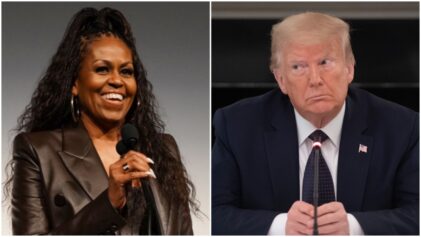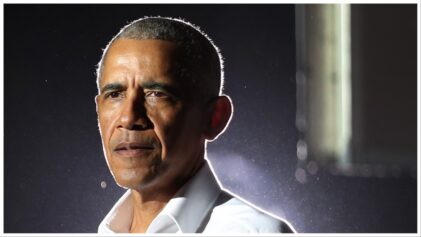And the hate just keeps on coming.
A radio talk host based in Arizona referred to President Obama last week as “the first monkey president.”
Barbara Espinosa made the remark on her show, “Hair on Fire,” after a caller described Obama as a communist with “rabbit ears.”
“Well, I don’t call him ‘rabbit ears,’ I call him a monkey,” she told the caller. “I don’t believe in calling him the first black president, I call him the first monkey president….I voted for the white guy, myself,” referring to Obama’s 2008 opponent, Sen. John McCain (R-Ariz.)
I thought when you played the dozens that the person being insulted needed to be in the room and given a chance to offer a pithy comeback. After all, this is a game, right?
There has always been name calling in politics and there is scarcely any black American who would be surprised to learn that someone would call Obama names, but the level of disrespect not just for this president, but for the office of the President of the United States (POTUS) has reached a new low.
A visiting reporter violated protocol last week by asking the president rude, pointed questions before Obama had finished his remarks and without being recognized. Last June, MSNBC contributor Mark Halperin said the president was “kind of a dick” for taking Republicans to task publicly.
And who can forget Rep. Joe Wilson (R-S.C.) for shouting out “You lie!”at President Obama as he delivered his health care address to Congress in 2009?
According to CNN, Wilson’s outburst may have gotten the most attention, but it wasn’t the only protest by Republicans during the speech, noting that Rep. Louie Gohmert, R-Texas, wore a sign around his neck that read, “What bill?” And when Obama asked Republicans to share their health reform ideas with him, a small group raised up a stack of papers above their heads.
A listener who identified himself only as “Joe,” took Espinosa to task last week (listen here) and asked if name calling was necessary to illustrate a point.
“You know, I’m not saying their ideas are right, but how about citing them intellectually instead of calling names? I have to say to you, the few things I just heard, they’re insulting. I mean, straight up insulting, and I think anyone listening would feel the same way.”
Espinosa was not chastened, later saying her remarks were constitutionally protected.
With freedom of speech, however, comes a responsibility to use judgment in one’s choice of words. It’s not a license to be rude, denigrating, destructive, or to incite ill will or harm.
Apparently, though, that doesn’t count when it comes to POTUS – or at least this particular one.
“I argue that any votes Obama gained due to his race in the general election (in 2008) were not nearly enough to outweigh the cost of racial animus, meaning race was a large net negative for Obama,” Stephens-Davidowitz, a Ph.D candidate in economics at Harvard University, who conducted research on the effect of “racial animus” on voting patterns, said in a 53-page report.
While other factors, including a staggeringly bad economy and U.S. involvement in two wildly unpopular wars, helped propel him to the presidency, candidate Obama still lost 3 to 5 percentage points in the national popular vote, Stephens-Davidowitz estimated.
Further, he said, that number could grow even more and hurt Obama’s chances in November.
“Quantifying the effects of racial prejudice on voting is notoriously problematic. Few people admit bias in surveys,” Stephens-Davidowitz wrote in an op-ed column in The New York Times. “So I used a new tool, Google Insights, which tells researchers how often words are searched in different parts of the United States.”
“The conditions under which people use Google — online, most likely alone, not participating in an official survey — are ideal for capturing what they are really thinking and feeling. You may have typed things into Google that you would hesitate to admit in polite company. I certainly have,” he wrote for The Times. “The majority of Americans have as well: we Google the word ‘porn’ more often than the word ‘weather.’”
He looked at research queries that included racially-charged language, including racist jokes and hate literature. He used data from 2004-2007 for a measure not directly influenced by feelings toward Obama. From 2008 onward, Stephens-Davidowitz said, “‘Obama’ is a prevalent term in racially charged searches.”
As a result, all these negative characterizations of and attacks on Obama are reinforcing subconscious racism and making it easier for some to vote against him – or perhaps not vote at all.
Jackie Jones, a veteran journalist and journalism educator, is director of Jones Coaching LLC, a career transformation firm.


